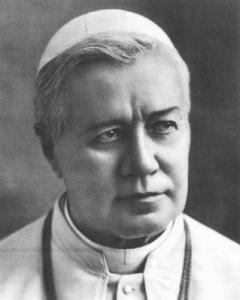The Monsignor, Italy, And The Untapped Reservoir.
Another beautiful blog post of Mgr Charles Pope (this is the Monsignor with no uncertain trumpet, or talking about locks and keys: when are they going to make him a bishop?), reminiscing of a country in which Christianity was not the enemy, but a deeply felt part of the everyday – and national – consciousness.
I could very well relate to his situation because, on a slightly different plane, I had analogous experiences and I saw the Italian society change in the meantime, though not in such a dramatic way. We had the “Hail Mary” and “Our Father” every morning at school before beginning lessons; religion (that is: Catholicism) was part of the curriculum from kindergarten on, and at school we had religion one hour a week. The country lived at the rhythm of the Christian clock; Christmas was very keenly felt, and the music above one of the most popular Christmas jingles, back in every home year after year. Sunday was the day of rest, Mass and football; the Crucifix was in every classroom, the Pope unceasingly on TV, the mass televised in its entirety at twelve every Sunday. There was a very fortunate radio program every evening and replied every morning: “ascolta, si fa sera”. Millions of children have listened to it whilst having breakfast, for sure, with Handel’s music the same year after year.
Many things have changed now. Sunday is not such a Christian day as it used to be, as the necessity to stress oneself seems to have extended to the seventh day; come to that, Sunday football has also been massacred on the altar of television, and a generation of Italians has grown up without knowing the incredible emotion of “tutto il calcio minuto per minuto”, the most beloved (from men) and most hated (from women) radio program of all times, with a soundtrack and emotions every Italian knew. No TV could ever equal it, I never felt the same emotion again.
Technology has made us stupid, the relentless quest for televised excitement has taken the best emotions away from us. We just pay much more for them; but I digress…
Crucifixes are still in every classroom, and in a healthy reaction to the attack of mad atheists and subversive Muslims the country has successfully fought to keep them where they are supposed to be. But you see that the country has changed; if not dramatically so, certainly worryingly so. “Ascolta, si fa sera” and “tutto il calcio minuto per minuto” are both still there, but the first now hosts Evangelicals and Jews, the second is mutilated by the TV-dictated match schedule.
In all this, the country is being rather admirable at keeping its Catholic roots. Not because of the generally disgraceful clergy (this is the country where some member of the clergy has the nerve of supporting the building of mosques, and others lend churches to Muslims; I hope they repent before they kick the bucket), but because Catholicism is surprisingly resilient, is in the very bone marrow of the country. In Italy, what Catholicism you still have you owe it to the wisdom and resilience of the people, not to the courage of the priests.
Like Monsignor Pope (I always smile at the name…), I see changes around me, and a society certainly less Christian. But I also see a huge untapped reservoir of Christian resources all over the West. It seems to me that Christianity is not dying at all, rather a bit of a sleeping giant; that when the Christian leaders (and most importantly, the Catholic ones) wake up and start to blow the battle horn, the soldiers will not be slow in rallying. In Italy, euthanasia and crucifixes have been clear Christian victories, and after four decades of clerical silence (meaning with this: clerical silence) opposition to abortion is probably not far from 40%. In England, a Pope whose attempted arrest had been feared has drawn crowds unthinkable just the week before; always in England, the virulent anti-Catholic media attack of Easter 2010 has caused a spectacular run of faithful to the churches in the Holy Week in what was clearly a massive popular reaction to the media attacks.
The troops are there. Even in England! Yes, they must be mobilised and trained. But the real problem is not the absence of troops. It’s the lack of willing generals.
Mundabor
Posted on July 20, 2011, in Catholicism and tagged ascolta, Catholic, Catholic Church, Catholicism, Conservative Catholic, conservative catholicism, Italy, Mgr Charles Pope, Pope, si fa sera, tutto il calcio minuto per minuto. Bookmark the permalink. 6 Comments.




















Mundabor,
you say the troops are there, and I certainly want to believe you. But I just don’t see them. In Germany, abortion is so accepted that nobody – absolutely nobody – even thinks it should be a crime. Not the so-called “C”DU, not most of the Bishops (with the possible exception of Cardinal Meisner), but – even more importantly for the argument to be made here – even some of the pro-life groups, restricting themselves to talking mildly about the perceived need to reduce the number of abortions, sometimes appearing to have accepted indefinitely the legality of that abominable slaughter of the Innocent. (They typically draw crowds less than 1000 people). It is unthinkable that anyone should talk or write about life-issues as I see it daily in the English-speaking world.
The issue of abortion is in my argument really just a stand-in for the whole question of a possible renaissance of the Faith. It is not just that the Bishops are silent (although they most certainly and culpably are), but that there is hardly any resistance left on the side of the people / laity. On the contrary, most regular churchgoers are over 60 years old and generally not the kind of people you would want to fight a spiritual war with (especially not in 20 years, if you get my meaning). Many of them show no outward signs of even believing in God, their church-attendance being apparently just a social custom, devoid of substance. And even all the regular Christian churchgoers together, even counting those who attend protestant services, make up less than 5% of the population.
Maybe in Italy, maybe even in England (do you have numbers concerning the “spectacular run of the faithful” you write of?), but in my experience not in Germany, and not in the German-speaking countries.
Of course, direct action of God is always possible, and we have certain knowledge about the triumph of the Church in the end. But apart from this? Just where are those “untapped Christian resources” that do NOT continue to trample everything the Church teaches? More than 98% of Catholics in Germany oppose the teaching of Humanae Vitae, and not just because of being uninstructed. They know what the Church teaches in this regard – it is hammered into them every day (“How backward they are!”) in the mainstream media they ceaselessly, mindlessly consume! This situation, I believe, is not much different in other parts of the snakepit of countries that once (before my birth) must have resembled something like Christendom.
And as regards crucifixes and euthanasia: I have heard about those successes. But how much of this would have happened under a leftist government? And if a leftist government had acted differently: would it have been voted out of office at the next opportunity regardless of economic issues?
So, count me skeptical about the troops.
Catocon.
P.S. Sorry if I got a little too heated (your blog, your judgment). And I don’t even have the excuse of being Italian if this happens…
Cathocon, allow me to go on your points with order:
1 Italy. Church attendance is around 25%, but when traditional Christianity is touched, people explode. You have seen this happening even with the atheist ads on the buses.
As far as th egovernment is concerned, I think you have it backwards: the previous centre-left coalition tried to push same-sex civil partnerships in the last parliament; a nasty mess ensued; at the following elections, those who has supported the initiative were simply massacred, with the two parties behind it (the commies and the greens) not even making it into Parliament.
On the other hand, you see Berlusconi remaning in power excusively because he protects Catholic values. Without that, the country would have thrown him in the bin a long time ago.
It is obviously all not so extreme (if it were, we had no abortion law as I speak), but there is a clear wall of resistance.
Believe me the potential is there. It is only waiting for the stirring and the shaking. Italians love a fight, if properly involved emotionally and with a proper Duce infront of them. De Gasperi was so one, or Pius XII. They were people who, as they say, “don’t take no sh*t” big time, and they lived in time of really, really aggressive anti-clericalism. Or Cardinal Biffi comes to mind, all these people. Padre Pio alone mobilised huge crowds. Even leaving aside Padre Pio, no one there of that calibre around I’m afraid.
2. Germany. Germany is difficult, I agree. But frankly, with the likes of Lehmann (who was in charge when I lived in Germany) they can’t be easy. In the USA you have a healthy debate also because you have the Chaputs, the Vasas and the Cuordileones. Nothing like that in Germany, at least not that I can remember during my time. Without tough people at the top, it will always be difficult.
But really, you should be more optimistic as that as you are yourself an example of what can happen! If an atheist can be corverted to the faith in a matter of a couple of years, how more easily can a tepid Christian be converted to orthodoxy! I can assure you from many personal experiences that in most cases they just don’t see clearly. Something must click, and without an open fight you are not much likely to get this.
The problem in Germany (as I have perceived them; feel free to disagree) is not that people are atheists; it is that they are not told what it means to be believers!
3. UK. I think in part the same reasoning applies. But here the situation is not so bad as in Germany. Twenty percent of the Catholics go to mass every sunday, the persecutions of the past create a certain attachment. Again, it is a problem of bad shepherds. Of course many of them are far too tepid, but the material is clearly there.
In my eyes, you make the mistake of seeing what people think today, rather than seeing that they can be easily (I mean, in many cases not more than a couple of years) turned around to orthodoxy.
Catholicism has a very strong power of attraction. It must be only put properly to use.
Things change. The same country that elected carter in 1976 elected Reagan in 1980.
M
Mundabor, in reply,
1. Italy:
I think I’ll defer to your superior knowledge of Italian politics. Because of its very Catholic past, Italy may indeed have many reserves left.
2. Germany and England:
I agree that I should probably be more optimistic. As I said in my original comment, God is indeed capable of great things, and converting someone like me cannot have been easy! But, as in my conversion, the action will have to be done almost exclusively by God, as the “material” (so to speak) in Germany is not very willing.
Additionally, there is a regional divide – big cities versus small towns – and in many small towns, your observation probably holds mostly true. But most Germans live in the big cities, and they appear utterly unreceptive. Moreover, as the years go by, the big cultural centers transform the whole country, remaking it in their image. Therefore, I have to stand by my observation that (apart from direct divine action) the future of the Church in Germany is very bleak.
3. On the attraction of traditional Catholicism:
On this you are most certainly right, or I wouldn’t be commenting on this blog. But in order to exercise its attraction Catholicism has to be known and understood. The human person is capable of stifling every kind of understanding, shutting out the light, if there is no fundamental willingness to listen to and search for the Truth. Therefore conversion requires at least a little honest interest in something that is not just useful but true. In my experience there is very little truth-seeking left in Germany and most people would be prepared to disbelieve everything even a strong leader, as you mentioned some, said, if it is unpleasant (as many of the things that need to be said clearly are, at least on the surface).
4. On the difficulty of converting tepid Christians:
On the one hand, they are much nearer to the truth than a hardened atheist. But often, their partial truths are used as a kind of protective shield around their errors. The hardened atheist faces even today a situation where the majority is not on his side. Therefore there is at least a litte fortitude and personal initiative involved in being an outspoken, “radical” atheist. Being atheist is also mostly a choice the atheist arrived at through (however flawed) attempts at reasoning. The concept of reasoning is not utterly foreign to him. That is something to work with. If through some circumstances his heart and mind are opened for the truth, he sometimes will really turn back and convert. But, as you rightly perceived, most people are not atheists, they just live etsi deus non daretur. A “weak” or tepid Christian lives right within the comfortable mainstream of society. He does not have to defend his beliefs. Often he has not even a residual amount of fortitude and willingness to earnestly think about the hard questions. Of course, God can convert tepid Christians, and we should certainly try, but I believe it to be the harder work.
But, of course, things can change. I appreciate your point. But let me make the same one in return: The same country that elected Reagan in 1984 elected Clinton in 1992 (and the current President in 2008, of course).
Catocon.
Catocon, beautiful post and allow me to say how I see it in the points you mention:
1. Italy is resisting because of the Catholic past, as you say; not because of the clergy of the present. But the Italian hierarchy has certainly more bite than, say, the English one. Not enough by far, mind.
2. In my eyes, in all things Catholics it is not us “doing” things, but us doing our best. When we start to pedal, God’s grace comes toward us and helps us to pedal faster and harder. I see this in my individual life and it seems to me that it has a collective application, too. The present situation is always the start. The change comes afterwards.
3. I see it (because it reflect my personal experience) as a kind of thin glass wall: many catholics know that there is world on the other side, but they have never been really thinking about the necessity of breaking the glass wall. They think that what they know and do is “good enough”. There is in them no desire to rebel to the church, merely no desire to know her better. The dismal ignorance in which they have been raised up doesn’t even allow them to see the gravity of not going to Mass, let alone of abortion. They are just not fully aware of the way their religious convictions are in conflict with their everyday life. We can see it, because we are properly instructed. They drink coca cola, because they think it’s how wine is drunk nowadays. That they are not really drinking wine, many of them can scarcely imagine.
4. In my personal experience, what leads many (and led myself) to deepen my Christianity is the contrast. People wake up to their own Christianity when their christianity is challenged in a dramatic way. As long as they think that “it’s a Christian country”, they will not feel the need to mobilise. I started to think seriously about Catholicism when I moved to England, a country where Christianity is an option among many, whose most basic principles were challenged. I never had such an impression in Germany until the homo-ehe. I had witnessed the march of 40,000 people in Bavaria to keep the crucifixes in their classrooms, and their victory in the end. I had seen a huge negative reaction when my employer had taken an “inclusive” initiative. I saw most people around me made pretty much of the same wood,Christianity never actively “challenged”. Not one vocal atheist met in eleven years, here in the UK you can’t save yourself from them anymore.
Yes, these are the very same people who don;t think about banning abortion. But this is beacuse they don;t think sufficiently of it and are not clearly put in front of the consequence of this thinking by their clergy (Catholics as well as protestant).
It is my opinion that if they were, Frau Merkel would be out of a job in a matter of years.
M
Mundabor,
I strongly agree on your first two points and most of the rest, especially the point about the importance of contrast.
But the way you are talking about your experience of living in Germany suggests to me that you must have been living in Germany more than a few years ago or in a small town in a traditionally Catholic part of the country. Because my experience is quite different. Most people I have met were either baptized Christians (Catholic or protestant) supporting every item on the agenda of 1968 or atheists. A survey for, I think, Infratest dimap, showed in 2010 that about 40% of the German population are formal non-Christians and about the same percentage report not to believe in (any sort of) God. Another survey (can’t recall the source) showed support for homosexual marriage (marriage, not just civil partnerships) between 60 and 70%.
Again, in Bavaria and some traditionally Catholic small towns the situation may be different. But in Germany as a whole, the majority today mostly supports the destructive agenda of their political leaders, except in sometimes protesting the slow speed of the descent.
Of course, if the alternatives were clearly posed to and understood by them, they might still turn back and reconsider. (And maybe, if we do our best, as you have said, God’s grace will supply the rest and effect a mass-conversion). But it is extraordinarily difficult to get a modern big-city dweller to even acknowledge anything other than his job, transient relationships, his personal pleasure, television / entertainment and “saving Mother Earth from evil entrepreneurs”. Even conservative Baden-Württemberg now has a radical homosexualist former maoist green Ministerpräsident seen as a “moderate” (because he is in fact, by German standards, rather moderate).* And unless one can get them to ask the right questions, they will not find the right answers. But they tend to shut out any mention of absolute Truth, the evil of contraception and hell, to name just three important issues. You can’t educate them, if they don’t listen.
By the way: “They drink coca cola, because they think it’s how wine is drunk nowadays.” Brilliant!
Catocon.
* Kretschmann is, in fact, a Catholic, and even a member of the ZdK (which means in plain English “Central Soviet of German Catholics”, a lay organisation). He also supported the terrorist regime of the Red Khmer and Pol Pot in the 1970s (this was not even an issue in the elections).
Yes Catocon: a) some years ago and b) conservative small town. I remember Erwin Teufel, who was, notwithstanding his name, rather different than this Kretschmann…. my impression was, though, that conservatism was by far more spread than people would admit in public.
The very existence of a former commie an din my eyes clearly atheist Lila Kuh as Prime Minister shows in my eyes the extent of the crisis; again, I think that this is nothign irreversible, bt certainly there is a lot of work to do.
M